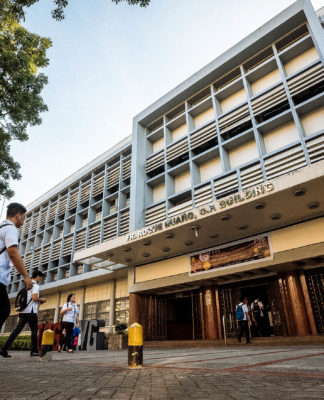THE FORTHCOMING Semestral break rings a sounding bell to Thomasians, particularly students, for it smells long trip, vacation, and a good break after a tiring semester, or at least, for some. Semestral break marks the beginning of the dreaded thesis for college seniors and for some graduate students as well. Because of the strenuous legwork and extensive research it requires, the University library provides Thomasians reliable resource materials needed for thesis research. Aside from library sections open for general use, the Graduate school, old books, rare books, archives, the map room, and Spanish sections provide thesis researchers accessible materials right inside the campus. Here is a little help on how to utilize these sections for thesis research:
1. Generally, the first step is to submit a typewritten request letter addressed to the Head librarian of the section and Fr. Angel Aparicio, O.P., prefect of Libraries.
2. Indicate in the letter the name of the researcher, course, year, section, the subject and purpose of research.
3. Have the letter signed by your professor or thesis adviser.
The request will be then subject to approval. Meanwhile, the Medicine and ecclesiastical library are open for general use. For some materials and information not available in the library, university and public libraries outside the campus will be helpful in gathering materials for your theses. Here are the ways and procedures on how to get in these libraries you might find useful in your research.
The Philippine National Library
A permanent reader’s card, costing P50, are required to library users. This card allows the reader to enter the reading areas and use their facilities. Here is a step-by-step procedure in obtaining a reader’s card:
1.Present a valid I.D. (school or office I.D., driver’s license, etc.) at the information desk and ask for a registration form.
2. Fill up all the information asked in duplicate copies.
3. Submit the form to the cashier and pay the P50 registration fee.
4. The cashier gives back the original copy of the registration form with the official receipt. Keep the registration form as a temporary permit for borrowing library materials and for research purposes.
5. Claim the permanent and laminated reader’s ID card at the information desk one month after the filing date. Present the official receipt and surrender the temporary permit.
Remember to log your name and address at the registry book, located at the ground floor lobby of the library, and to deposit your belongings (except paper, pens, money, and valuables) at the deposit counter.
De La Salle University Library
For non-DLSU graduate and undergraduate, a P80 fee is charged paid at the accounting office. Here is how to make DLSU Library materials accessible for Thomasians:
1. Present your I.D. at the security desk located at the main entrance of the library.
2. Submit to the information-reference desk attendant, at the 2nd floor, the following requirements:
A. A referral letter signed by the chief librarian or any authorized official or project officer.
B. The official receipt of payment.
C. A consortium card or alumni card.
3. Fill the visiting user form provided from the information-reference desk.
University of the Philippines-Diliman
The UP College of law library, Marine Science Library, College of Science Library, and Engineering Library allows graduate students and private researchers only on Wednesdays with a P50 per day charge. A P50 per hour fee is charged for the use of computer facilities and P4 per sheet is charged for printouts. Meanwhile, a P10 per sheet printout is charged for microfilm facility users.
Meanwhile, former members and students may use the library free of charge for five days. Beyond five days, a P20 fee is charged.
The Ateneo De Manila University
The ADMU library charges a fee of P50 per day or P1000 per semester for graduate students and a P20 charge per day for undergraduate students. Maria Rowena Gracia T. Alera

















